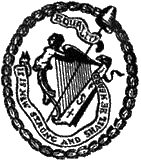
|
THE CATHOLIC RELIEF ACT, 1778The process by which the penal laws were dismantled began in 1774 with the provision of a new oath of allegiance intended to be acceptable to conscientious Catholics. This 1778 law enabled Catholics to hold land on longer and more advantageous leases and ended the process of dividing land owned by a Catholic among his sons upon his death. AN ACT FOR THE RELIEF OF HIS MAJESTY'S SUBJECTS PROFESSING THE POPISH RELIGION Whereas by an Act made in this kingdom in the second year of her late Majesty Queen Anne, entitled, An Act to prevent the further growth of popery, and also by another Act made in the eighth year of her said reign for explaining and amending the said Act, the Roman Catholics of Ireland are made subject to several disabilities and incapacities therein particularly mentioned; and whereas for their uniform peaceful behaviour for a long series of years it appears reasonable and expedient to relax the same, and it must tend not only to the cultivation and improvement of this kingdom, but to the prosperity and strength of all his Majesty's dominions, that his subjects of all denominations should enjoy the blessings of our free constitution, and should be bound to each other by mutual interest and mutual affection, therefore be it enacted … that from and after the first day of August 1778 it shall and may be lawful to and for any papist, or person professing the popish religion, subject to the proviso hereinafter contained as to the taking and subscribing the oath and declaration therein mentioned, to take, hold, enjoy any lease or leases for any term or term of years, not exceeding nine hundred and ninety-nine years certain, or for any term of years determinable upon any number of lives, not exceeding five, provided always, that upon every such lease a rent bona fide to be paid in money shall be reserved and made payable during such terms with or without the liberty of committing waste, as fully and beneficially to all intents and purposes, as any other his majesty's subjects in this kingdom, and the same to dispose of by will or otherwise as he shall think fit; and all lands tenements, hereditaments, whereof any papist or person professing the popish religion is now seized or shall be seized by virtue of a title legally derived by, from, or under such person or persons, now seized in fee simple or fee tail, whether at law or in equity, shall from and after the time aforesaid be descendable, deviseable, and transferable, as fully, beneficially, and effectually, as if the same were in the seizin of any other of his Majesty's subjects in this kingdom.... III. Provided, that no papist or person professing the popish religion shall take any benefit from this Act, unless he or she shall on or before the first day of January 1779, or some time previous to any such lease made to or in trust for him, if he or she shall be in this kingdom, or within six months after any devise, descent, or limitation shall take effect in possession, if at that time within this kingdom, or if then abroad beyond the seas, or under the age of twenty-one years, or in prison, or of unsound mind, or under coverture, then within six months after his or her return from abroad, or attaining the age of twenty-one years, or discharge from prison, or becoming of sound mind, or after she shall become a femme sole, take and subscribe the oath of allegiance and the declaration prescribed by an Act passed in this kingdom in the thirteenth and fourteenth years of his present Majesty's reign, …1 V. And be it enacted ... that no maintenance or portion shall be granted to any child of a popish parent, upon a bill filed against such parent ... out of the personal property of such papist, except out of such leases which they may hereafter take under the powers granted in this Act, … VI. And whereas by an Act made in this kingdom in the second year of the reign of her late Majesty Queen Anne, entitled, An Act to prevent the further growth of popery it is amongst other things enacted to the effect following; in case the eldest son and heir of a popish parent shall be a Protestant, … such popish parent shall become and be only tenant for life of all the real estate, whereof such popish parent shall then be seized in fee tail or fee simple, and the reversion in fee shall be vested in such eldest son, being a Protestant subject, ... and whereas it is found inexpedient to continue any longer that part of the said recited Act, be it enacted ... that from and after the first day of November 1778 the conformity of the eldest son ... shall no affect or alter the estate of any popish parent ... but such popish parent shall remain seized and possessed of the same estate and interest in all and every his or her real estate, as he or she would have been, if such eldest son had not conformed, or the said Act of the second year of Queen Anne had not been made. X. Provided also that no person shall take benefit by this Act who having been converted from the popish to the Protestant religion shall afterwards relapse to popery, nor any person who being a Protestant shall at any time become a papist, or shall educate or suffer to be educated, any of his children under the age of fourteen years in the popish religion. STATUTES AT LARGE PASSED IN THE PARLIAMENTS HELD IN IRELAND, 1310-1800 (1786-1801), vol. 11, pp. 298-301. Footnote
Extracted from Edmund Curtis and R B McDowell editors, Irish Historical Documents 1172-1922 Methuen London 1943 pp194-196 |